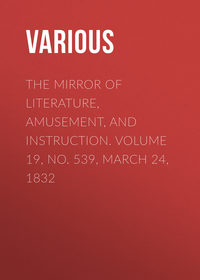The Mirror of Literature, Amusement, and Instruction. Volume 19, No. 539, March 24, 1832

Полная версия
Добавить В библиотекуАвторизуйтесь, чтобы добавить
Добавить отзывДобавить цитату
The Mirror of Literature, Amusement, and Instruction. Volume 19, No. 539, March 24, 1832
Авторизация